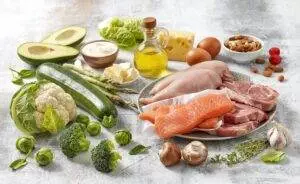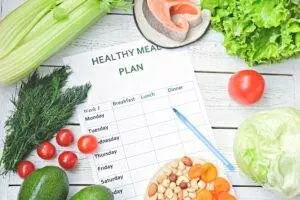
Getting Started With the Keto Diet? Here’s Everything You Need to Know
The ketogenic diet, or simply “keto” for short, is a low-carb, high-fat diet that has become increasingly popular in recent years. It’s based on the idea of burning fat for fuel instead of carbohydrates and has been shown to have numerous health benefits, including weight loss, improved brain function, and reduced risk of chronic diseases like type 2 diabetes and heart disease.
If you’re new to the keto diet and wondering where to start, this guide will cover everything you need to know. From what foods to eat to common mistakes people make when starting out, we’ll help you navigate your way through the world of keto so you can achieve optimal results.
What Is The Keto Diet And How Does It Work?
At its core, the keto diet involves reducing your intake of carbs while simultaneously increasing your consumption of fats. This shift in macronutrient ratios puts your body into a state called ketosis, which occurs when your liver produces ketones as an alternative source of energy since there isn’t enough glucose available from carbs.
By limiting carbs, you also reduce insulin levels, which helps to lower inflammation throughout the body and improve overall health markers. Additionally, eating more healthy fats provides essential nutrients needed for optimal bodily functions and supports satiety, making it easier to stick to the diet long term.
The Best Foods To Eat On A Keto Diet Plan

One of the most significant challenges people face when starting the keto diet is knowing what foods they should be eating. While there are many options available, some are better than others depending on factors such as taste, convenience, and nutritional value.
Here are some of the best foods to include in your keto diet plan:
1. Fatty cuts of meat (e.g., bacon, steak)
2. Fish and seafood
3. Nuts and seeds (e.g., almonds, chia seeds)
4. Avocado
5. Low-carb vegetables (e.g., spinach, broccoli, cauliflower)
6. Full-fat dairy products (e.g., butter, cheese, cream)
Common Mistakes People Make When Starting The Keto Diet
While the keto diet is generally safe and effective, there are several common mistakes people make when starting out that can hinder their progress or even lead to negative side effects. Some of these include:
- Not consuming enough calories – Since the keto diet is typically lower in carbs, it can be easy to accidentally consume too few calories overall. Be sure to track your intake carefully and aim for at least 1800 calories per day if possible.

- Overdoing it with protein – While protein is important, consuming excessive amounts can prevent ketosis by raising insulin levels. Stick to moderate amounts of lean proteins like chicken breast or salmon.
- Neglecting hydration – Dehydration is a common issue among those following the keto diet due to increased water excretion. Drink plenty of fluids throughout the day to stay well-hydrated. Consider drinking hydrogenated water, a unique blend of pure water and extra hydrogen molecules. Unlock additional health benefits, from increasing your energy levels to slowing down the aging process, and even improving muscle recovery after a workout. Click here to learn more.
Meal Planning Tips For Successful Keto Dieting
Once you understand what foods to eat and avoid on the keto diet, meal planning becomes crucial for success. Here are some tips to get started:
Plan ahead – Take time each week to map out your meals and snacks for the upcoming days. This ensures you always have healthy options available.
Use recipes – There are countless delicious keto recipes available online that make it easy to prepare tasty meals without sacrificing compliance.
Incorporate variety – Don’t get stuck in a rut; try new foods and flavors regularly to keep things interesting.

Supplements You May Need While Following A Keto Diet
Finally, supplements may play a role in supporting your overall health while following a keto diet. Consider adding the following to your regimen:
1. Multivitamin – Since the keto diet can be deficient in certain micronutrients, taking a daily multivitamin can fill any gaps in your nutrition.
2. Magnesium – Many people experience constipation during keto, which can be alleviated with magnesium supplements.
3. Electrolytes – Due to increased fluid losses, electrolyte imbalances can occur on the keto diet. Ensure adequate sodium, potassium, and magnesium intake through supplements or food sources.

Exercise Recommendations For Optimal Results With The Keto Diet
In addition to proper nutrition, exercise plays a critical role in achieving optimal results with the keto diet. Here are some recommendations for incorporating physical activity into your routine:
- Resistance training – Strength training can help build muscle mass and increase metabolism, leading to greater fat burn.
- High-intensity interval training (HIIT) – Short bursts of intense exercise followed by rest periods can boost cardiovascular fitness and promote fat loss.
- Moderate aerobic exercise – Activities like walking or cycling can support general health and aid in weight management.

Conclusion
Starting the keto diet can feel overwhelming, but with the right information and tools, it doesn’t have to be. By focusing on whole, minimally processed foods, tracking your intake, and incorporating regular exercise, you can successfully transition to a keto lifestyle and enjoy all the associated health benefits.

